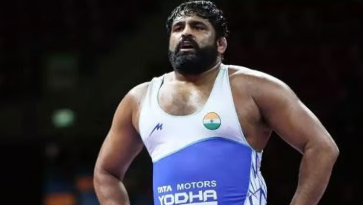
Summary – At just 18, Sumit Malik clinched silver at the U-20 World Wrestling Championships, igniting hope and spotlighting challenges in Indian wrestling’s future.,
Article –
Sumit Malik, an 18-year-old wrestler from Haryana, achieved a significant milestone by winning a silver medal at the Under-20 (U-20) World Wrestling Championships in Bulgaria. This accomplishment marks both his personal success and the rising prominence of Indian wrestling on the international stage, though it also highlights the challenges faced by young athletes in India’s wrestling ecosystem.
Setting the Stage
The U-20 World Wrestling Championships is a key event where the best junior wrestlers around the world compete. Malik participated in a highly competitive weight category demanding a blend of physical prowess, technical skill, and tactical intelligence. India’s wrestling heritage has been strong, producing Olympic and World Championship medalists, and Malik’s silver medal continues this legacy.
The Turning Point
Malik’s journey to the silver medal involved overcoming several tough matches, showcasing resilience and strategic thinking. Despite financial and infrastructure limitations common among Indian athletes, he demonstrated exceptional skill and endurance. His semi-final bout was decisive—he battled fiercely against a top contender and narrowly missed the gold, underscoring his composure under pressure.
Tactical and Technical Breakdown
Malik’s wrestling style is a mix of traditional Indian Kushti (pehlwani) techniques combined with modern freestyle moves. Key aspects of his technique include:
- Strong grip strength
- Swift leg attacks
- Effective defensive counterattacks
- Excellent positional control to maintain leverage while conserving energy
- Quick decision-making when shifting between offense and defense
This high wrestling IQ is the result of years of disciplined training and mentorship.
Psychological Strength
Competing internationally demands immense mental toughness. Malik’s calm demeanor amid aggressive opponents and unfamiliar conditions highlights a maturity and ambition that bode well for his long-term prospects in wrestling.
Reactions from the Sport
Malik’s silver medal has earned praise from wrestling federations, experts, and revered Indian wrestlers. They recognize him as a rising star deserving of enhanced training support and sponsorship. Coaches note that his success despite financial hurdles indicates a need for improved athlete development programs.
International commentators also commend wrestlers like Malik for raising the competition standards at youth championships and reflecting a growing global parity in wrestling.
What Comes Next?
Malik’s achievement brings attention to the challenges and opportunities facing young wrestlers, both in India and globally. Key future steps for Malik include:
- Transitioning smoothly into senior-level competitions
- Gaining more international exposure
- Refining tactics against seasoned opponents
The continued commitment from his federation and secure sponsorships will be critical to easing financial pressures and fostering growth.
More broadly, Malik’s rise calls for a re-examination of youth sports infrastructure worldwide, reaffirming that talent alone is insufficient without adequate resources, coaching, and psychological support. With major sporting events like the Olympics approaching, the wrestling community will be closely watching Malik’s progress and its implications for the sport globally.
Sumit Malik’s silver medal signals a bright future for Indian wrestling, blending the country’s rich tradition with fresh promise. The next phase will test how effectively Malik and his peers capitalize on this momentum and inspire changes in youth wrestling development worldwide.

More Stories
The Showdown at the World Athletics Championships: Decoding the Men’s 100m Final
The Sprint Battle That Will Define a Generation at the World Athletics Championships
Inside the High-Stakes Showdown of the Men’s 100m Final at World Athletics Championships